Where Do I Find Suitable Online Reading Resources?
Some chinese resources (found in this article: https://kaohongshu.blog/2019/12/03/should-i-read-chinese-texts-above-my-level/
Where do I find suitable online reading resources?
Free online resources:
My Chinese Reading (all levels) *I’ve used this it’s great, especially as graded reading material that gradually increases in difficulty in a manageable way
Mandarin Bean (all levels)
HSK reading (all levels) *Just looked, seems good for finding graded reading material specific to HSK level
Chinese Reading Practice (all levels) *I’ve used this, also great for graded reading material that manageably increases in difficulty
Just learn Chinese (all levels)
The Marco Polo Project (advanced)
Mandarin version of the New York Times (advanced)
BBC news in Mandarin Chinese (advanced)
Chinese news from Deutsche Welle (advanced)
Project Gutenberg in Chinese (highly advanced)
An Annotated Collection of Digitized Chinese Texts for Students of Chinese Language and Culture (highly advanced) *I’m looking at this right now and a ton of useful material
More Posts from Lia-kotik-blog and Others
Reviewing tones as an intermediate in Chinese
As a beginner it takes a bit of time to become accustomed to be able to hear the difference in tones, yet alone pronounce them very correctly. By the time you get to intermediate you probably can hear the difference in tones but you may still have trouble pronouncing every single word correctly. However you most likely have a number of words that you have heard so often that you do pronounce correctly. For example 中国 zhong1 guo2, I bet most intermediates pronounce this is the correct tone as it is a word occurring so often that our brains automatically imitate pronunciations. However, when we encounter a new word we may have difficulty getting the tone just right, and then you need to remember it too.
I have two bits of advice that may help with this, that I myself am using to improve my tones over time:
As soon as you learn a new word, repeat at least 10 times in the correct tone.
As I said when speaking Chinese, you are speaking at a speed that you don’t have time to remember which tone the word is, you say it how you remember it. So when you learn a new word you want to try to cement the correct ‘rhythm’ (or tone) of the word in your head. If you remember the incorrect one it may be difficult to undo this. (i remember I pronounced 文化 as wen2 hua2 for the longest time and it was difficult to change this to wen2 hua4 in my head when i discovered i had been saying it all wrong!)
Memorise a few ‘tone pairs’ to remember the ‘rhythm’ when you learn a new word.
Hacking Chinese ( https://www.hackingchinese.com/focusing-on-tone-pairs-to-improve-your-mandarin-pronunciation/ ) has a great article on tone pairs and it’s merits. Recently when i learn a new word I recall the 'model’ word that I have for that particular tone pair, say it a few times to remember the 'rhythm’ of the word, the n say the new word I want to learn in that same rhythm, therefore it will help saying the word in the correct tone.
For example, lets say I learnt the new word 生活 sheng1 huo2, this has the same tone pair as 中国, therefore when i learn 生活 i can easily recall how 中国 is pronounced and imitate the same rythym when i said 生活. I created a table for myself with the tone pairs and so each time I encounter, for example any word that is first tone-second tone (such as 中国), then i can recall the rythym easily in my head.

This table has a list of words that I subconsciously pronounce with the correct tones as a result of hearing them so many times, there are however too many words that i don’t pronounce in the correct tone, hence i use this method to help :P
(ignore my terrible handwriting!)
Please try this out and let me know if you try this out and how it works for you??




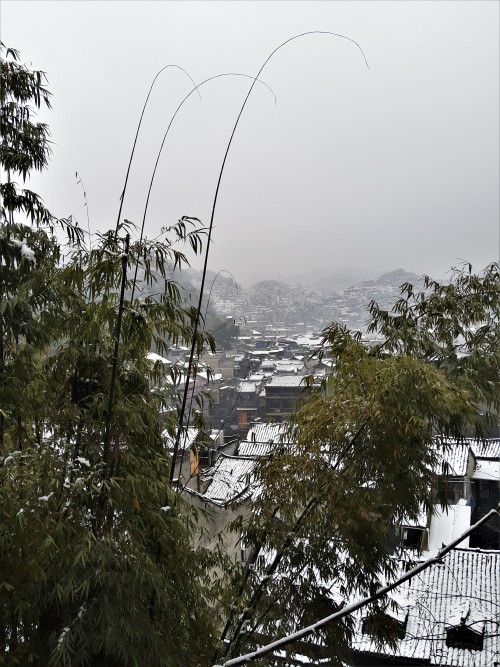

Winter in Fenghuang, Hunan
A compilation of people from a few of the 56 official ethnic groups in China wishing everyone a happy Duanwu (Dragon Boat Festivial) from 2021.
song: 半生雪 - 是七叔呢
English added by me :)
沉鱼落雁,闭月羞花
Literal Translation: to make fish sink and wild geese drop, to outshine the moon and shame the flowers
Individual Characters:
沉 (chén) : to sink
鱼 (yú) : fish
落 (luò) : to fall/descend (降落)
雁 (yàn) : wild goose (大雁)
闭 (bì) : to shut/close; to obstruct (note: this word appears in lots of two-character words having to do with shutting/closing, but I can't find a word it's in that means "outshine" like it does in this phrase, unless one of you knows of one, it's most likely a purely metaphorical meaning)
月 (yuè) : moon
羞 (xiū) : to shame
花 (huā) : flower
Story:
This one has to do with the Four Beauties (四大美人) of China. If you don't know their stories, I'd recommend looking into them; I'm not going to rehash them here because I don't know them very well myself, but I'll give a brief summary (keep in mind these will be very surface level and there's much much more to the stories)
西施 (xī shī) lived during 春秋, the Spring and Autumn Period (770-476 BCE) and is the first of the 四大美人。 She went to the river one day to wash clothes, and, seeing her through the water, the fish were so stunned by her beauty that they forgot to swim and sank to the bottom of the river. Her story makes up the 沉鱼 portion of this 成语。
王昭君 (wáng zhāo jūn) lived during 西汉, the Western Han Dynasty (206 BCE-25 CE). During this time period, the Xiongnu and the Han kept having border skirmishes, so the emperor decided to send 王昭君 to marry the leader of the Xiongnu. On her way, she played her lute. The geese heard the music and looked down, forgetting to fly after seeing her beauty. Her story makes up the 落雁 portion.
貂蝉 (diāo chán) lived during 东汉, the Eastern Han Dynasty (25 - 220 CE). It's said that when she went out at night, clouds would immediately cover the moon. Because of this, it was said that she outshone the moon. Her story makes up the 闭月 portion.
杨玉环(yáng yù 杨宇huanhuán) lived during 唐朝, the Tang Dynasty (618 - 907 CE). She was selected to be a concubine because of her beauty, but she missed home. One day, while walking in the palace gardens, she touched a flower. It folded in on itself, and, a palace maid having seen, the legend that 杨玉环 shamed the flowers with her beauty was born. Her story makes up the 羞花 portion.
Figurative Meaning:
沉鱼落雁:to be incredibly beautiful/captivating
闭月羞花:to be unnaturally/exceedingly beautiful
沉鱼落雁 and 闭月羞花 can be used together or separately
Resources/Further Reading:
Road to Learning Chinese Podcast (A)
Road to Learning Chinese Podcast (B)
Chinese Tuition Singapore (all Chinese story)
Yang Chen Live Journal
Confucius Classroom (video for learners)
老梁 (video completely in chinese and designed for natives i think?)
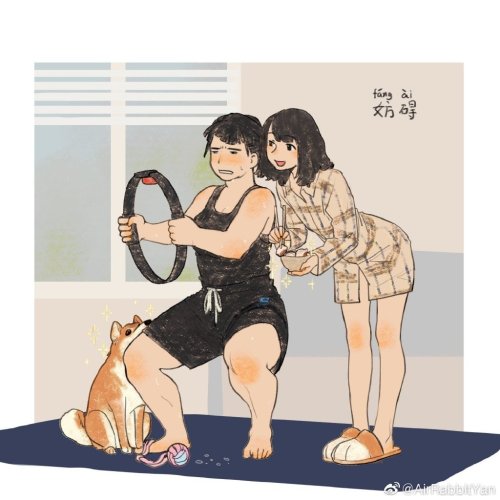

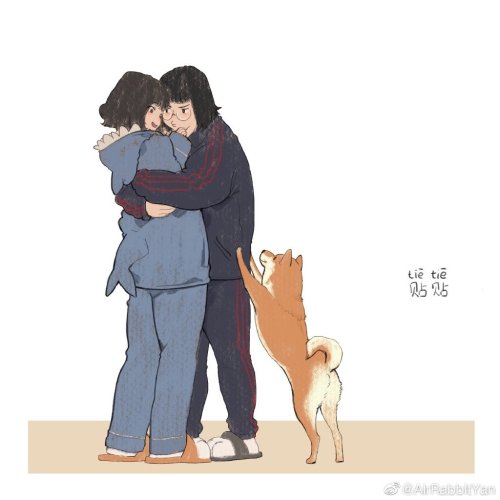
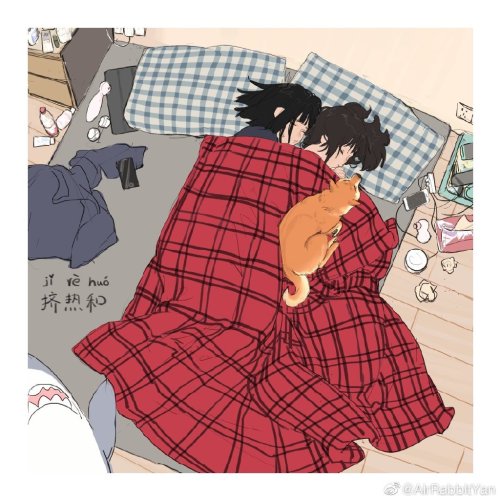
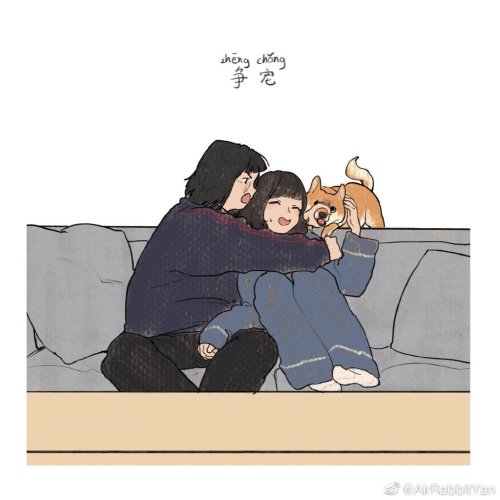
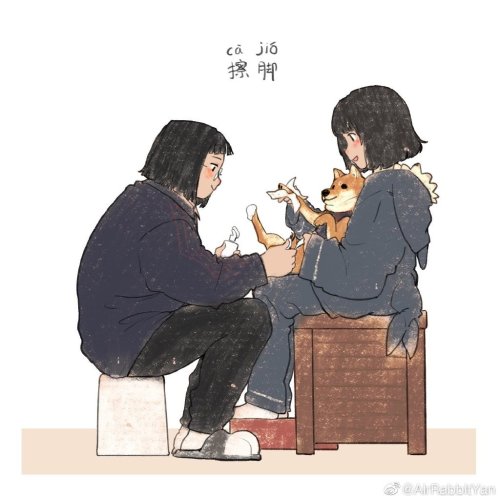
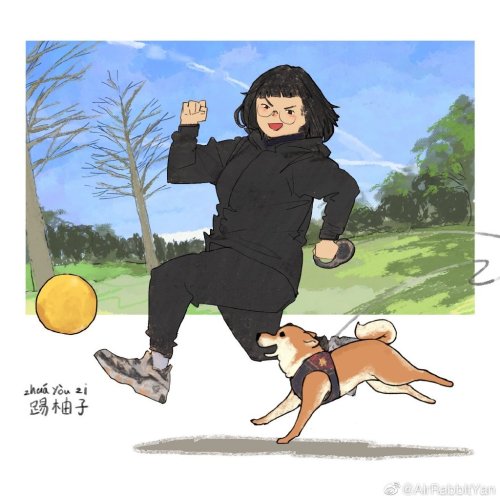
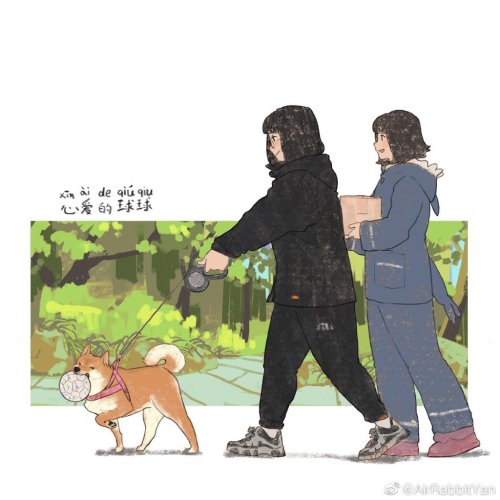
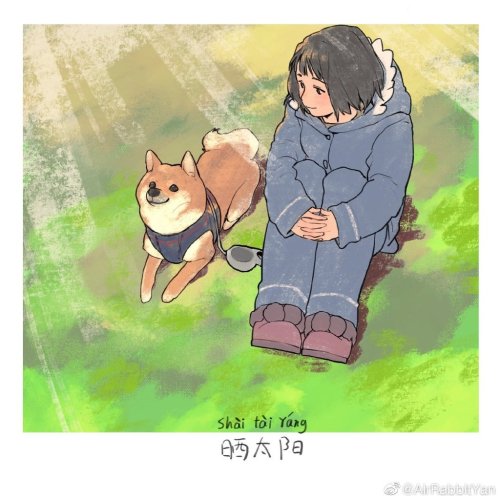
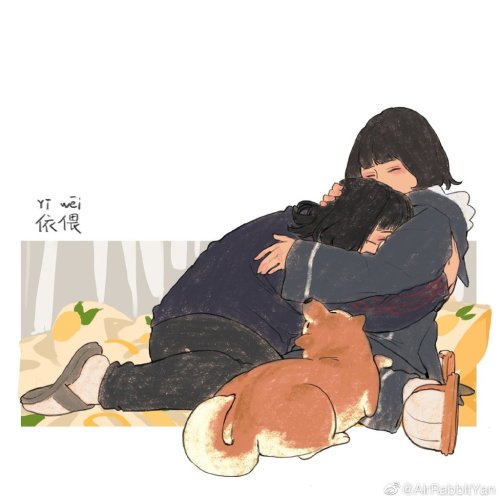

©AirRabbitYan
Some language learning exercises and tips
These are some of the activities I do. Maybe you'll find them helpful:
Write a mock dating profile for yourself. Describe yourself, list your hobbies and interests, hopes for the future, likes and dislikes, and the qualities you're looking for in a partner. Enjoyed it? Write one for your favourite character/OC.
Try to find a Youtuber who plays your favourite game and does commentary in your target language. I watch this guy a lot.
Describe locations in your favourite books, games, movies, TV shows etc. I like to wander the Hitman maps and write about the different areas, NPCs, and situations I observe.
Write a mock interview with your character/influential figure of choice.
Choose a fairy tale and write your interpretation of it in your target language.
When you're cooking, say what you're doing out loud as if you were talking to a studio audience.
Imagine your mutuals are coming to your city for a visit. Write up a lil guidebook for them describing places of interest. Write an itinerary to practice using the future tense and "first", "then", "after that", etc statements.
A chalk marker might be useful to you. I write important words and phrases that I'm having trouble remembering on my bathroom mirror. I just wipe them away with a damp cloth later.
Review books, albums, movies etc in your target language. Either write down your review or record yourself talking about it.





上海外灘 Shanghai bund
hey! what's the mandarin term for bisexual? does or have any cool etymology? are there any modern/youthful slang terms (such as P/T) for other lgbt people? just curious. thanks!
Bisexual is 双性恋, or just "双". 双 means two so it's basically the exact same meaning as "bisexual".
I guess since you asked, I'll just go through some basic/popular terminology real quick:
General terms:
同性恋 (tóng xìng liàn) = homosexual ; homosexuality
同志 (tóng zhì) = (lit.) comrade; (slang) gay/homosexual
You can add "男" (male) or "女" (female) in front of either of these two phrases to specify gay vs lesbian.
酷儿 (kù'er) = (loanword) queer
A lot of general modern LGBT terminology is borrowed from the west, i.e, "出柜" (chū guì ; to come out of the closet" or 弯 (wān; "bent"); 直 (zhí; straight).
Lesbian
女同性恋 (nǚ tóng xìng liàn)/女同(志) (nǚ tóng zhì)/ 拉拉 (lā lā) / 百合 (bǎi hé; "lily")
P = 婆 (pó; "wife)/femme
T = Tomboy/butch
H = "half", or 不分 ("doesn't separate") = a lesbian who doesn't differentiate these categories or doesn't identify with either P nor T
Gay
男同性恋 (nán tóng xìng liàn)/男同(志) (nán tóng zhì)
EDIT bc I forgot: 基友 (jī you3) meaning “gay partner” or “close samesex friend” (often for servicemen/firemen/police) is also a common term
零 (líng; 0); 受 (shòu ) = bottom
一 (yī ; 1); 攻 (gōng)= top
0.5, 10, 可攻可受 (kě gōng kě shòu), 兼备 (jiān bèi) = versatile
There's a lot of numbers involved. If you see stuff like 101 or 001 etc these are just referring to the "roles" in a threesome, etc. Numbers are sometimes also used for lesbians, where T = 1, P = 0, and H = 0.5, but I feel like this is less common. The thinking is a little binary in this regard but adherence to this ~structure~ is really case by case, just as it is in the west with tops vs bottoms in LGBT culture.
Within P/T/0/1/etc slang, there are also adjectives that may be added in front of these classifiers. Ex: 肌肉0 (muscular bottom); 公0 (manly bottom), 大母/母0或大母1 (effeminate bottom or effeminate top); 铁T (iron butch; basically super/manly butch)... It's all really arbitrary stuff, sort of like "twink" and "bear" and all that.
Bisexual: 双性恋, 双 (shuāng).
Pansexual: 泛性恋 (fàn xìng liàn) (泛 is a transliteration of "pan-" and has the same meaning of 'general' or 'extensive').
Nonbinary: 非二元 (fēi èr yuán) ("non" "binary" direct translation)
Genderqueer: 性别酷儿 (xìng bié kù'er) ("gender" "queer" direct translation)
[Anecdotally I would speculate that "pansexual", "nonbinary" and "genderqueer" are not popular self-designations as I have never seen them being used online outside of LGBT resource literature taken from the west]
Transgender: 跨性别 (kuà xìng bié) (跨 means "to step across" or "to straddle")
Asexual: 无性恋 (wú xìng liàn) (无 means "not to have" or "no"/"lacking")
Misc
第四爱 (dì sì ài; "the fourth love") sometimes gets brought up in discussion of LGBT terms (although by western standards, it's really completely unrelated). It sort of has a broad meaning but usually it just refers to pegging with a female top and male bottom. I think this might be more of a term from fiction because it's often brought up with other fictional concepts like Alpha and Omega.
Reading rec list for chinese learners. This is not exhaustive, if you find stuff that works for you then go for it! This is also not perfect, you may find stuff a bit easier or harder is more ideal for you. (By "know" below I mean you recognize the word as familiar, have studied or looked it up at some point, and so if you need to look it up again in reading you will learn it longer term fairly easily because of the repeated exposure to it in reading).
Know ~500 words?
Mandarin Companion Graded Readers. I recommend the Sherlock one, and the Journey to the Center of the Earth one. All Mandarin Companion books are excellent for beginners though.
Pleco Graded Readers - I recommend The Butterfly Lovers. There are a lot of Pleco Graded readers though, so you can pick based on amount of unique words (some Graded readers on Pleco go up to 2000 unique words).
Know ~1000-1500 words?
Sinolingua Chinese Graded Readers. There are several, and I started with the 500 word one. They somewhat match up with HSK and I found them more challenging than the Mandarin Companion graded readers. They have a vocabulary list in the back of the book and footnotes to help you study. They are a good bridge to get you from graded readers to other materials. I found the 1000 and 2000 word book equally difficult.
Pleco Graded readers, which include readers from 1000-2000 unique words.
Start delving into manhua! If you're ready and feel like it! Easier manhua will be slice of life setting ones, and ones based on something you're already familiar with. So if you've watched the Untamed or read 魔道祖师, then the manhua will be easier for you. If you've watched The Lost Tomb Reboot, then try out the slice of life comedy manhua spin off 盗墓笔记重启日常向 https://m.ac.qq.com/comic/index/id/649452. My Story 他们的故事 is a gl manhua which is slice of life and easy to read, as is 19天. There's also more genre specific manhua which I waited a bit to read, but if you're familiar with the story they may be doable like 2ha's manhua and 破云 manhua.
Know ~1500-2000 words?
Start getting into easier novels. Suggestions include 活着 (anything by this author is often recommended to learners, I have not actually read anything by him yet), 小王子 (this was my first not-graded-reader novel I finished reading in chinese, it was a bit challenging, I used a english/Chinese copy so I could look up words occasionally), 笑猫日记: 会唱歌的猫 (I highly recommend this series of books, they're for kids and fairly straightforward, set in a city so decently useful words are used, with a lot of chengyu that's commonly used so they're worth learning, I read 2 of these novels), 他们的故事 by 一根黄瓜丝儿 (a bl novel that's first person, generally uses a lot of common daily life words, and is fairly straightforward, I've read half and it was the first real novel I tried to read in chinese). These novels can be tried earlier on if you're more willing to use a click dictionary, which is what I did (except for 小王子 since I had a print copy). 论如何错误地套路一个魔教教主 The Wrong Way to a Demon Sect Leader (a fairly easy wuxia bl read).
Also in general anything you've read before in a language you understand, is going to be easier to read in chinese than something brand new.
Feeling brave? Up for a challenge?
撒野 and anything by that author uses a lot of more everyday language and is an easier read than some other webnovels. 盗墓笔记 does not use particularly hard language outside of the tomb genre words which if you're reading then you need to look up and learn anyway eventually (the slang in it is a bit hard but also worth learning so the cursing etc trips you up less later in other stuff you read), if you've seen the show before its doable to read. Scum Villain Self Saving System is on the easier end of mxtx novels to read, especially if youre already familiar with the plot.
Know ~2000 words?
The same novels as before apply. But now you may need a dictionary a bit less. Stuff like 撒野 will now be a bit less difficult, still challenging. Now other novels will start to be doable as desired, if you're using a dictionary. So go have fun looking into whatever webnovels you're interested in.
(I made a list of difficulty ratings of various webnovels in my rec list tag, you may want to check out that list. A quick gadget though is like... 撒野 author is easier than 盗墓笔记 author, then mxtx, then priest (and tian ya ke and zhenhun are easier than silent reading and sha po lang), and poyun was higher on the difficulty scale, 2ha was fairly hard. Basically the more vocabulary or thicker the paragraphs, the harder it's gonna be. Or the less familiar you are with a given genre).
At ~2000 words or more I'd say reading with a click dictionary feels quite doable, although a slog if you pick a harder novel so gauge what feels an okay level for you personally to read. And if you feel like reading without a dictionary, you'll have to explore a bit to see what's comprehensible to you without one.
reading web novels/articles for traditional chinese mandarin language learners
if you’re like me and want to eventually make reading your primary way of learning chinese characters, you’ll notice that a lot of the resources online are using simplified characters. new tong wen tang (chrome; firefox) is a browser extension that will help you convert webpages between simplified and traditional chinese. and regardless of the writing system, another helpful extension to have is zhongwen (chrome; firefox), which adds the ability to hover over a chinese character and see a pop-up containing the pinyin and english translation of a word.
before enabling the two extensions (notice how everything is in simplified!):

after enabling new tong wen tang and zhongwen (text has been converted to traditional chinese and doesn’t interfere with zhongwen’s pop-up dictionary):

-
 coffeecupstudy reblogged this · 6 months ago
coffeecupstudy reblogged this · 6 months ago -
 sharcbait liked this · 9 months ago
sharcbait liked this · 9 months ago -
 bronteblues liked this · 10 months ago
bronteblues liked this · 10 months ago -
 max-yellow liked this · 11 months ago
max-yellow liked this · 11 months ago -
 florecilladecanela liked this · 1 year ago
florecilladecanela liked this · 1 year ago -
 sweetlikecandysblog reblogged this · 1 year ago
sweetlikecandysblog reblogged this · 1 year ago -
 sweetlikecandysblog liked this · 1 year ago
sweetlikecandysblog liked this · 1 year ago -
 gloriyaki liked this · 1 year ago
gloriyaki liked this · 1 year ago -
 scamanderpotter reblogged this · 1 year ago
scamanderpotter reblogged this · 1 year ago -
 moekoiz liked this · 1 year ago
moekoiz liked this · 1 year ago -
 notanicedoor reblogged this · 2 years ago
notanicedoor reblogged this · 2 years ago -
 alsalosblog liked this · 2 years ago
alsalosblog liked this · 2 years ago -
 5bloodyroses liked this · 2 years ago
5bloodyroses liked this · 2 years ago -
 lotusclouding liked this · 2 years ago
lotusclouding liked this · 2 years ago -
 almareda liked this · 2 years ago
almareda liked this · 2 years ago -
 rkiveofstudies reblogged this · 2 years ago
rkiveofstudies reblogged this · 2 years ago -
 ayin-me-yesh reblogged this · 2 years ago
ayin-me-yesh reblogged this · 2 years ago -
 ayin-me-yesh liked this · 2 years ago
ayin-me-yesh liked this · 2 years ago -
 ajnabasvhejejsbsbsbs liked this · 2 years ago
ajnabasvhejejsbsbsbs liked this · 2 years ago -
 aromantic-and-aromatic liked this · 2 years ago
aromantic-and-aromatic liked this · 2 years ago -
 justangie04 liked this · 2 years ago
justangie04 liked this · 2 years ago -
 hue4 liked this · 2 years ago
hue4 liked this · 2 years ago -
 sugakoutarou reblogged this · 2 years ago
sugakoutarou reblogged this · 2 years ago -
 softcorekrys liked this · 2 years ago
softcorekrys liked this · 2 years ago -
 chrestomancies liked this · 2 years ago
chrestomancies liked this · 2 years ago -
 yinnixuexi reblogged this · 2 years ago
yinnixuexi reblogged this · 2 years ago -
 virtuousnight reblogged this · 2 years ago
virtuousnight reblogged this · 2 years ago -
 coleridges reblogged this · 2 years ago
coleridges reblogged this · 2 years ago -
 yu-dreams reblogged this · 2 years ago
yu-dreams reblogged this · 2 years ago -
 flamesong liked this · 2 years ago
flamesong liked this · 2 years ago -
 coleridges liked this · 2 years ago
coleridges liked this · 2 years ago -
 imcrazybutfree liked this · 2 years ago
imcrazybutfree liked this · 2 years ago -
 justanotherfariha liked this · 2 years ago
justanotherfariha liked this · 2 years ago -
 yinlotus reblogged this · 2 years ago
yinlotus reblogged this · 2 years ago -
 sippingmysillycoffee liked this · 2 years ago
sippingmysillycoffee liked this · 2 years ago -
 lia-kotik-blog reblogged this · 3 years ago
lia-kotik-blog reblogged this · 3 years ago -
 lia-kotik-blog liked this · 3 years ago
lia-kotik-blog liked this · 3 years ago -
 yonyongs liked this · 3 years ago
yonyongs liked this · 3 years ago -
 liekkihare liked this · 3 years ago
liekkihare liked this · 3 years ago -
 purples0mething liked this · 3 years ago
purples0mething liked this · 3 years ago -
 babushkoshka reblogged this · 3 years ago
babushkoshka reblogged this · 3 years ago